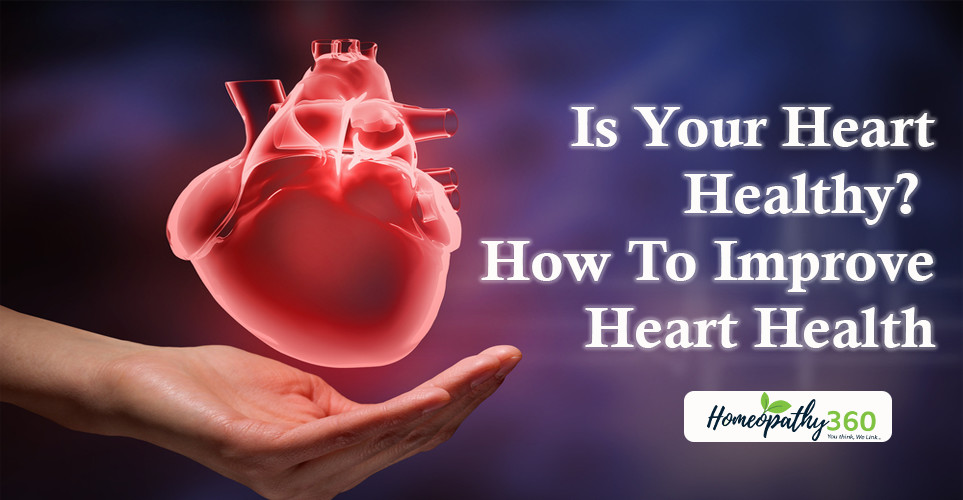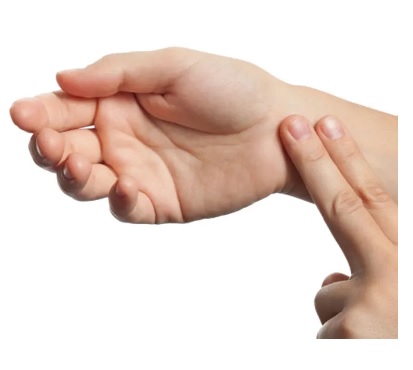
Check Your Heart Rate
Your doctor will feel your pulse to check your heart rate and rhythm. Each pulse matches up with a heartbeat that pumps blood through your arteries.
Finding out your pulse helps your doctor judge the strength of your blood flow and blood pressure in different areas of your body.
To measure your pulse on your own:
– Get a watch with a second hand.
– Place your index and middle finger of your hand on the inner wrist of the other arm, just below the base of the thumb. You should feel a tapping or pulsing against your fingers.
– Count the number of taps you feel in 10 seconds.
– Multiply that number by 6 to find out your heart rate for 1 minute.
You can tell how fast your heart beats and whether it’s regular by feeling your pulse. Your heart rate is the number of times your heart beats in 1 minute. A normal resting heart rate for adults ranges from 60 to 100 beats per minute.

Besides checking your pulse, your doctor can hear the opening and closing of your heart valves by using a stethoscope.
Check Your Blood Pressure
Blood pressure is the force of the blood against the walls of your arteries as your heart pumps it around your body. There are two ways it’s measured:
Systolic blood pressure. This is the pressure in your arteries when your heart squeezes.
Diastolic blood pressure. It’s the pressure in your blood vessels when your heart is relaxed, between heartbeats.
High blood pressure, also called hypertension, is a blood pressure reading of 130/80 or higher.
Years of high blood pressure can stiffen and narrow your artery walls, which blocks the blood flow to your heart. It can lead to heart disease or heart attack.
Normal blood pressure for an adult, when you’re at rest, is less than 120 over less than 80. The 120 is the systolic pressure. The diastolic pressure is 79.
Your blood pressure may go up or down depending on your age, heart condition, emotions, activity, and the medications you take. One high reading doesn’t mean you have high blood pressure. You need to measure it at different times while you’re resting to find out your typical numbers.

Blood Tests
Your doctor may suggest a blood test to check your levels of sodium, potassium, albumin, and creatinine. Abnormal levels could suggest problems with organs like your kidneys and liver, possible signs of heart failure.
A blood test can measure levels of your cholesterol, including LDL “bad” cholesterol and HDL “good” cholesterol. It can also help diagnose other conditions such as anaemia or thyroid disease that can affect your heart.


What signs may indicate a problem with the heart?
The signs and symptoms of a heart that is not in good health include:
- palpitations
- shortness of breath
- fatigue
- swelling of the neck, abdomen, and lower body
- high blood pressure
- high blood cholesterol
People who smoke or have a high body mass index (BMI) have an increased risk of developing cardiovascular health issues.
Some measures for reducing the risk of cardiovascular disease.
There are several ways you can reduce your risk of developing coronary heart disease (CHD), such as lowering your blood pressure and cholesterol levels, acquiring a healthy lifestyle. Certain changes to day-to-day routines, such as adopting a low carbohydrate, keto, or paleo diet, may lead to an HDL increase.
Eat a healthy, Balanced Diet
A low-fat, high-fibre diet is recommended, which should include plenty of fresh fruit and vegetables (5 portions a day) and whole grains.
You should limit the amount of salt you eat to no more than 6g (0.2oz) a day as too much salt will increase your blood pressure. 6g of salt is about 1 teaspoonful.

There are 2 types of fat: saturated and unsaturated. You should avoid food containing saturated fats, because these will increase the levels of bad cholesterol in your blood.
Foods high in saturated fat include:
- meat pies
- sausages and fatty
- cuts of meat
- butter
- ghee – a type of
- butter often used in
- Indian cooking
- lard
- cream
- hard cheese
- cakes and biscuits
- foods that contain coconut or palm oil
However, a balanced diet should still include unsaturated fats, which have been shown to increase levels of good cholesterol and help reduce any blockage in your arteries.
Foods high in unsaturated fat include:
oily fish
avocados
nuts and seeds
sunflower, rapeseed, olive and vegetable oils
You should also try to avoid too much sugar in your diet, as this can increase your chances of developing diabetes, which is proven to significantly increase your chances of developing CHD.
A 2020 study found that low carbohydrate diets can help prevent or reverse type 2 diabetes and metabolic syndrome, potentially reducing the risk of cardiovascular disease.
Be more physically active
Exercising regularly reduces your risk of having a heart attack. The heart is a muscle and, like any other muscle, benefits from exercise. A strong heart can pump more blood around your body with less effort.
Any aerobic exercise, such as walking, swimming and dancing, makes your heart work harder and keeps it healthy.
Give up smoking
If you smoke, giving up will reduce your risk of developing CHD.
Smoking is a major risk factor for developing atherosclerosis (furring of the arteries).
Research has shown you’re 3 times more likely to successfully give up smoking if you use NHS support together with stop-smoking medicines, such as patches or gum.
Reduce your alcohol consumption
If you drink, do not exceed the maximum recommended limits.
Men and women are advised not to regularly drink more than 14 units a week
spread your drinking over 3 days or more if you drink as much as 14 units a week
If you want to cut down, try to have several drink-free days each week
Always avoid binge drinking, as this increases the risk of a heart attack.
Reference
https://www.webmd.com/heart-disease/diagnosing-doctors-exam
https://www.medicalnewstoday.com/articles/at-home-heart-health-test#how-we-chose
https://pubmed.ncbi.nlm.nih.gov/32773574/
https://www.medicalnewstoday.com/articles/159283
https://www.medicalnewstoday.com/articles/263834
https://www.nhs.uk/conditions/coronary-heart-disease/prevention/





